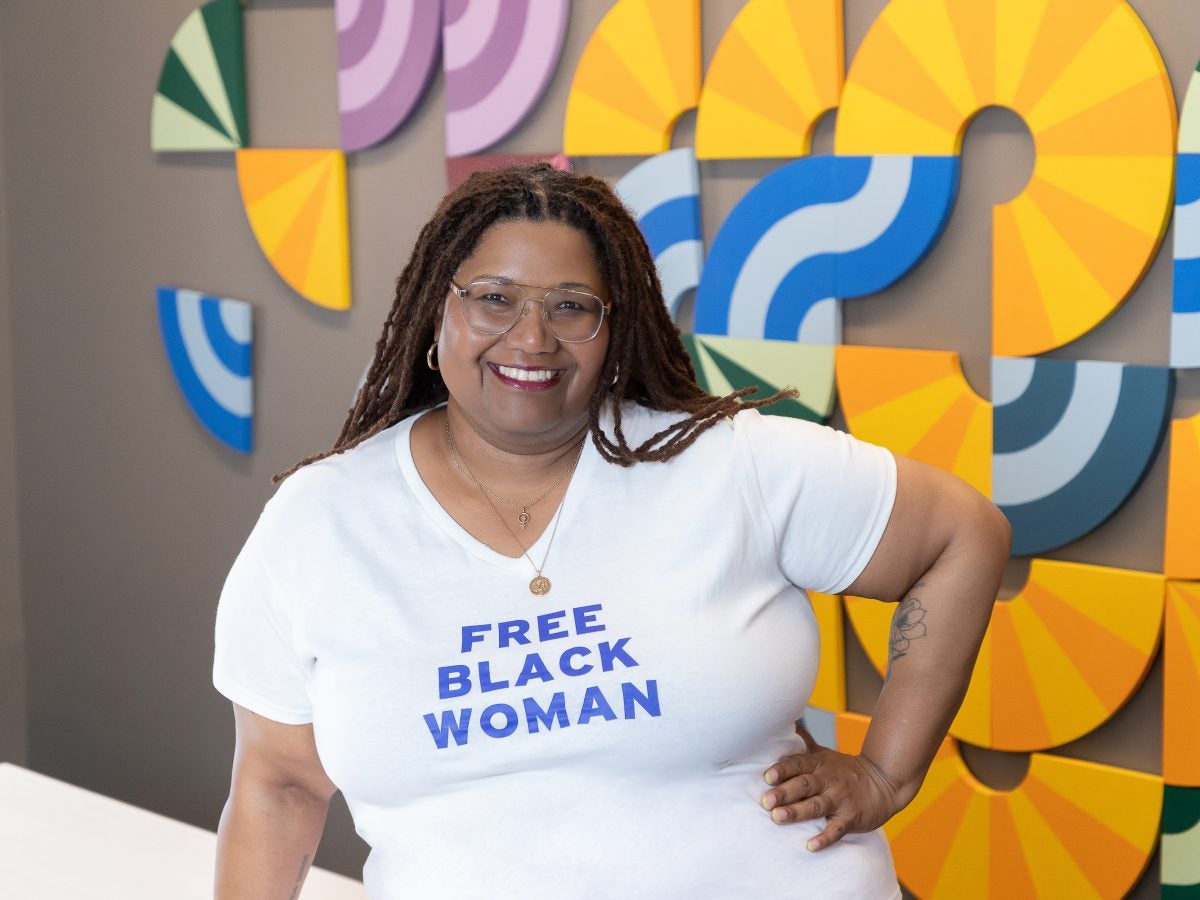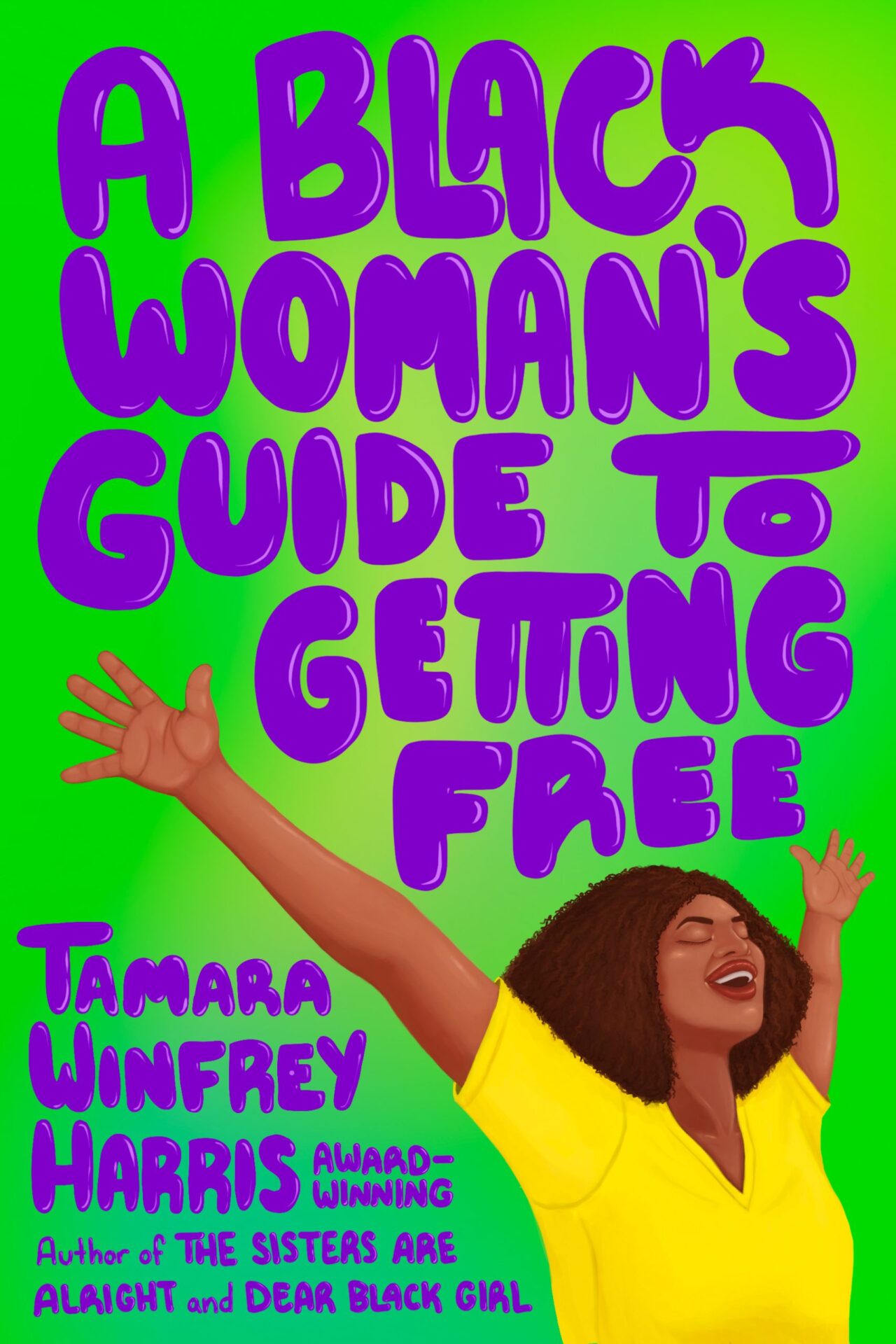 Courtesy Tamara Winfrey-Harris
Courtesy Tamara Winfrey-Harris  By Veronica Wells ·Updated August 9, 2024
By Veronica Wells ·Updated August 9, 2024
We talk about, sing about, and yearn for freedom. Still, for all of the discussions of freedom, it’s an elusive concept when you try to define it and even more abstract when you try to live it out in your own life. Author Tamara Winfrey-Harris was confronted with this quandary at a book event for her previous work, Dear Black Girl. In it, Winfrey-Harris writes that if Black women and Black girls loved and were vulnerable with each other, they’d get free together. A woman in the audience needed more clarification. “How are we supposed to do that?” she asked. “There’s racism, and there’s sexism, and there are all of these things that work against us getting free. So what does that look like?”
Winfrey-Harris wrote her new book A Black Woman’s Guide to Getting Free as a response.
“I’ve spent a lot of time highlighting the things that keep us not free,” Winfrey-Harris tells ESSENCE. “I’ve talked about that enough. So now I want to talk about the joyful part of our lives and how we actually get free.”
More than obscure, elusive ideals, Winfrey-Harris lays out realistic, tangible ways Black women can do the work of becoming truly liberated.
First, a loose definition. “Freedom is very personal, so what feels authentic and free to me may not be the same thing to you,” Winfrey-Harris says. “For me, it’s when I’m able to show up unapologetically as my true self: my hair, my comportments, my speech. I am able to do all of those things without judgment. Several other women said freedom is freedom of choice. We want to be free to choose ourselves and choose the people we love without judgment and without barriers.”

The journey begins, Winfrey-Harris says, with believing you deserve it.
“You have to love yourself,” she says. “Although we say that we do, we don’t really demonstrate that we do. You have to intentionally try to find moments that nourish you and give you joy; that’s how you demonstrate that you love yourself and you deserve freedom. If you’re killing yourself for any reason, then it’s kind of hard to get free.”
The second step is to spot the distortion.
“Spot messages about strength and our place, even the negative messages about our hypersexuality, anger and aggression,” Winfrey-Harris explains. “We recognize them when they’re in our faces. But we don’t often recognize them when they’re subtle or even when they’re coming from people who claim to love us. Some of those messages are underscored in the music we listen to, in church, from our parents.”
Once you spot the ways in which we’re being suppressed and diminished, you can begin to combat that with the truth. But first, you have to know it, which means being able to locate yourself outside of the distortions society attempts to cast on Black women.
“We spend so much of our lives trying to outrun those distortions,” Winfey-Harris says. “‘Okay, show up like this to prove you aren’t who they say you are.’ Or, in some cases, leaning into them. ‘Black women are strong, so you shouldn’t need a therapist.’ Who are you if you let all of that go and really look at your authentic self?”
Looking at and embracing our authentic selves requires us to accept the difficult parts of ourselves as well. “There are a lot of benign things about our lives that we’re always told are wrong. We’re the only group of people where people are like, ‘You’re too educated and successful. Who will want you?’ We have to learn to celebrate all those things about us even if we’ve been told they’re bad. Even if they’re genuinely mistakes we’ve made.”
For A Black Woman’s Guide to Getting Free, Winfrey-Harris interviewed a woman who is a recovering addict, a sexual assault survivor, and a former sex worker. That woman said, “Even though those are things that may have been stigmatized, they are a part of me. It got me to where I am today, so how dare I leave those out of my story.”
Giving ourselves grace for our mistakes is not exactly a strong suit for Black women. The practice isn’t modeled in many places. But once we start practicing giving that grace to ourselves, we’re able to extend it to other Black women.
“If you’re not free and you’re buying into all those distortions, then I’m looking at you thinking: ‘Is she going to wear that? Is she going to speak that way?’” Winfrey-Harris says. “I feel like it reflects on me, and I’m going to be judged based on what she does. ‘Is she wearing a bonnet outside? What’s happening?’ Once you are comfortable with your own freedom, you give other Black women more latitude to show up as their full selves–as opposed to expecting other Black women to show up for the white gaze.”
Lastly, Winfrey-Harris issues a warning. Know the cost of liberation.
“The reality is that showing up as your authentic self may come with a penalty,” she says. “It may even be unsafe. It could be dangerous. It could be unwelcome. We still have navigate that. So when we do it from a place of freedom, it involves knowing how much you are willing to ‘pay’ in order to be in that space.”
Freedom is like a muscle. It takes time and practice to build and strengthen. It can atrophy so we must always be in the process of working it out.
“I don’t believe you get there, and you just stay there,” Winfrey-Harris says. “We are always facing all of these obstacles that are pulling us away from freedom. So, we have to know how to pull ourselves back.”
When it comes to Black women who are living free, Winfrey-Harris says it’s hard to tell, as far as women in the public eye. We only know what we see. Still, she looks toward women who seem to be living as their true selves.
Freedom, more than a destination, is an ongoing journey.
“We’re all a work in progress,” Winfrey-Harris says. “So I look to the women who keep trying.”
TOPICS: Books
The post Author Tamara Winfrey-Harris Shares 3 Tips To Help Black Women Get Free appeared first on Essence.
